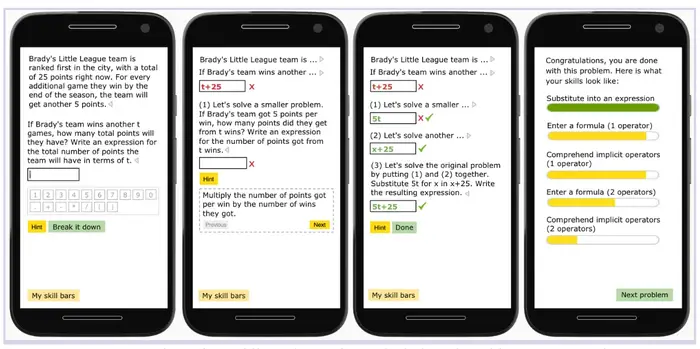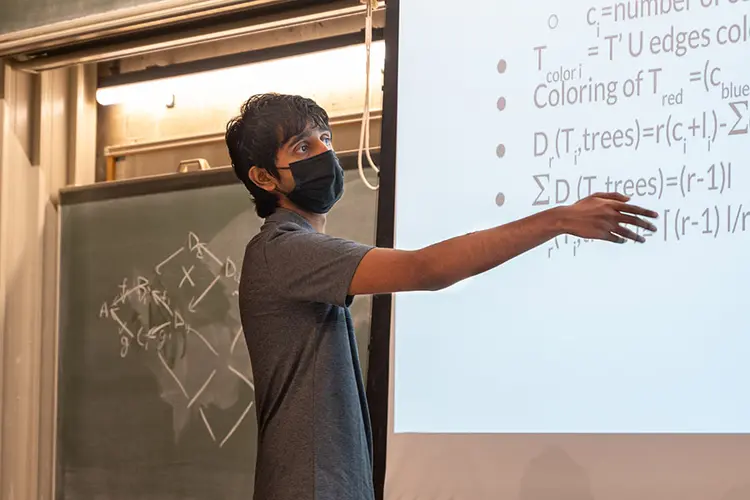HCII Researchers Awarded $2M Grant To Test AI-Based Mobile Tutoring Software
Media Inquiries
Homework can be extra difficult for middle school students facing limited access to technology, lack of parental support or other factors that could hinder their learning.
To help, Carnegie Mellon University School of Computer Science(opens in new window) researchers in the Human-Computer Interaction Institute(opens in new window) will use a $2 million grant from the U.S. Department of Education's Institute of Education Sciences(opens in new window) to develop and test a smartphone-based tutoring system for middle school mathematics that's rooted in artificial intelligence.
The project, "Optimizing AI-Based Tutoring Software for Middle-School Mathematics on Smartphones(opens in new window)," investigates how student math outcomes improve when support increases. Specifically, the team wants to understand if data-optimized AI-based tutoring software, smartphones and social motivation can work together to enhance learning.
"We think it's a good package because it addresses different parts of the problem," said Vincent Aleven(opens in new window), a professor in the HCII and head of the project. "We'll explore these three conditions individually and test if each one by itself brings improvements. Then at the end, we'll combine it all and conduct a comparative study."
A team of HCII researchers will use a grant from the U.S. Department of Education's Institute of Education Sciences to develop and test a smartphone-based tutoring system for middle school mathematics that's rooted in AI.
Aleven will collaborate with the HCII's Ken Koedinger(opens in new window), Paulo Carvalho(opens in new window) and Jonathan Sewall(opens in new window), as well as Ph.D. student Conrad Borchers and postdoctoral researcher Meng Xia. To design the mobile-learning software, the team will use learning units from the HCII's comprehensive web-based tutoring system, Mathtutor(opens in new window).
According to Aleven, past research has shown that more teenagers have access to smartphones than computers. Even though this gap may have lessened with the COVID-19 pandemic's shift to remote schooling, students still face obstacles to completing homework on desktop and laptop computers.
"There are situations where a sibling may be using the only home computer, and there's still the issue of at-home internet access," he said. "By bringing the software to a smartphone platform, kids can access it on the go, on the school bus or while their home computer is in use. We'll investigate whether that might increase the amount of time students spend doing homework."
But making an AI-based tutoring system accessible on smartphones won't help if students don't use it. The team will look at social motivation and the role parents can play in encouraging learning. The software will include a feature that sends "nudges" via push notification to parents, encouraging them to engage their children in conversations about the value of math, inform them of upcoming lessons, explain concepts and suggest ways to guide their children.
"Parents are sometimes reluctant to help because they might think they are not good at math or they're afraid they'll explain it differently than a teacher," Aleven said. "This is an opportunity where students and parents can all learn together."
The research will generate new scientific knowledge regarding how to best use advanced learning technologies. If the three-pillared approach proves successful in boosting homework outcomes, it could lay the groundwork for curriculum enhancements in the future and could especially benefit those of lower socioeconomic status.
"With concerns about equity coming to the foreground, a wonderful outcome would be that we see improvements for students in disadvantaged situations," Aleven said.
The first study of this four-year project will begin at the end of October in the Pittsburgh-area Deer Lakes School District.
Vincent Aleven




